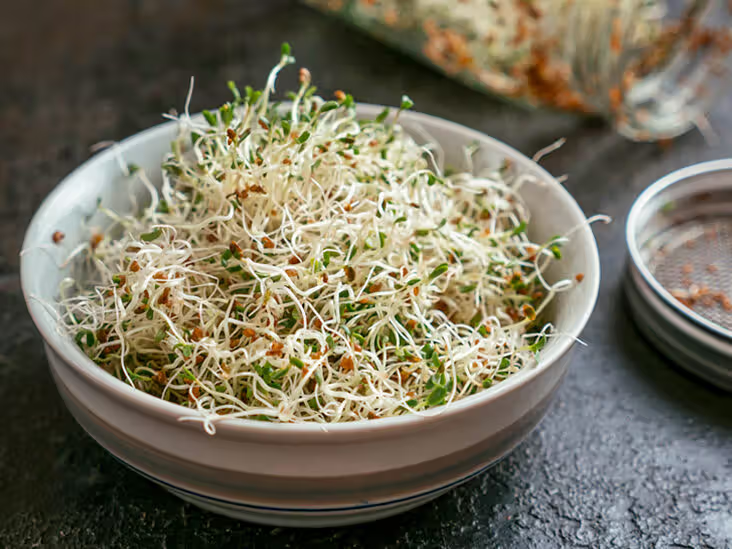Can Chickens Eat Alfalfa? A Complete Guide to Sprout Safety
As someone who’s raised chickens for over a decade, I’m often asked about feeding alfalfa to backyard flocks. I’ll tell you straight up – yes, chickens can absolutely eat alfalfa, and it’s actually a fantastic supplement to their regular diet. But there’s more to the story than a simple yes or no answer.
What Makes Alfalfa Special for Chickens?
I’ve found that alfalfa is like a superfood for chickens, packed with essential nutrients. With 4% protein, 0.7% fat, and 2.1% carbohydrates, it’s a well-balanced addition to your flock’s diet. What really excites me about alfalfa is its incredible vitamin content – it’s loaded with vitamins A, D, E, K, and B complex.
When I first started feeding alfalfa to my chickens, I noticed they particularly enjoyed it in sprout form. The sprouting process makes the nutrients more accessible and digestible for them. It’s like serving them a living, growing multivitamin!
Different Ways to Feed Alfalfa to Chickens
Through my years of experience, I’ve discovered several effective ways to offer alfalfa to chickens:
- Fresh alfalfa leaves and stems
- Sprouted alfalfa seeds
- Dried alfalfa hay
- Alfalfa meal
- Pellets containing alfalfa
Safety Considerations When Feeding Alfalfa
While alfalfa is generally safe, I’ve learned some important safety tips I’d like to share. First, when sprouting alfalfa, cleanliness is crucial. I always make sure to use clean containers and fresh water to prevent mold growth. If you spot any signs of mold, don’t risk it – throw the batch out and start fresh.
I’ve noticed that some chickens might take time to adjust to alfalfa, especially if they’ve never had it before. That’s why I always introduce it gradually, mixing small amounts with their regular feed before increasing the portion size.
The Benefits of Feeding Alfalfa to Your Flock
Here are the key benefits I’ve observed in my flock when incorporating alfalfa into their diet:
- Improved egg yolk color due to high carotenoid content
- Better feather quality from increased protein intake
- Enhanced immune system function
- Increased calcium absorption
- Better digestive health
Common Misconceptions About Alfalfa and Chickens
Let me clear up some myths I often hear. First, alfalfa won’t make your chickens fat – remember, it’s only 0.7% fat! Some folks worry it might be too high in protein, but at 4%, it’s actually a moderate protein source that complements their regular feed well.
Another misconception I hear is that chickens won’t eat alfalfa. In my experience, while some might be hesitant at first, most chickens will readily consume it once they’re familiar with it. The key is proper introduction and preparation.
How Much Alfalfa Should You Feed?
I’ve found that moderation is key when it comes to alfalfa. I typically offer it as a supplement, not as a primary food source. For my flock, I aim for alfalfa to make up no more than 10-15% of their daily diet. This ensures they’re getting the benefits without compromising their intake of other essential nutrients from their regular feed.
Seasonal Considerations
I’ve noticed that alfalfa can be particularly beneficial during certain seasons. In winter, when fresh greens are scarce, sprouted alfalfa provides that much-needed boost of nutrients. During molting season, the extra protein helps support feather regrow


:max_bytes(150000):strip_icc()/GettyImages-1387139366-c723f29dbc064a51a60445daaa463b55.jpg)